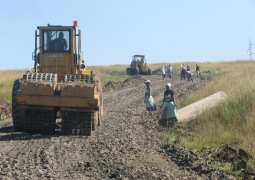
The Portfolio Committee on Rural Development and Land Reform continued its public hearings on the Communal Property Associations (CPA) Bill [B12-2017] in Nkowankowa, Tzaneen, yesterday (10 August 2017).
The beneficiaries of CPAs in the Nkowankowa area raised a number of concerns, which were also raised in the Western and Eastern Cape. The mismanagement of funds, the interference of traditional leaders, corruption and fraud; and beneficiaries not knowing exactly what CPAs are, were highlighted as some of the main reasons behind the loss or illegal sale of beneficiaries’ properties.
Another issue relates to the term of office of CPAs executives, where executives often do not give up their positions but rather abuse the system to retain their influence over the CPAs. Further concerns relate to training and capacity building of newly-elected executive members. Beneficiaries felt that executive members often do not have the necessary skills to effectively run the CPAs, causing many CPAs to be placed under administration.
The Nkowankowa CPA beneficiaries raised a number of other concerns which were not mentioned in the other provinces. With reference to the proposed amendment that speaks to the functions of the registrar as record keeper of any bank accounts opened in the name of an association, beneficiaries were of the opinion that CPAs financial matters should be kept private within the confines of the CPAs, and only be made available when suspected mismanagement of funds is suspected.
CPAs beneficiaries said the establishment of Communal Property Institutions District Forums (CPIDFs) by the Department of Rural Development and Land Reform in the province has a number of functions which might be similar to that of the proposed registrar’s office. The beneficiaries requested that the proposed amendments should acknowledge the existence of these offices and they too be allowed to share the responsibility of ensuring compliance within the CPAs. They in fact suggested that the registrar be appointed from the CPIDFs.
The Committee said the proposed amendments came about as a result of the bad experiences of CPAs beneficiaries. In many cases, CPAs beneficiaries are not informed about important decisions, a situation that often results in them losing their properties. One of the main contributing factors of this is the unavailability of documents which are often in the hands of a select few. Thus, the establishment of a registrar’s office, which will have records of all CPAs financial details, will assist beneficiaries by giving them access to these documents and thereby creating a system of transparency within the CPAs. The Committee further said that it is not the intention of the Department of Rural Development and Land Reform to babysit CPAs as was suggested by one participant, but rather to assist CPAs in functioning effectively, transparently and to the benefit of all its beneficiaries.
The proposed amendments seek to provide improved protection of the rights of communities with regard to the property administered by the association and will limit the intervention of outside stakeholders who are not seen as beneficiaries, as has been highlighted throughout the public hearings held thus far. Intervention by the Department of Rural Development and Land Reform, through the office of the registrar, will thus only take place where it is deemed necessary.
The Committee thanked the beneficiaries of the Nkowankowa CPA for their valuable insight and advised the Department of Rural Development and Land Reform to examine and address the issues relating to CPAs beneficiaries being unacquainted with the functions of CPAs.
By Felicia Lombard
11 August 2017

